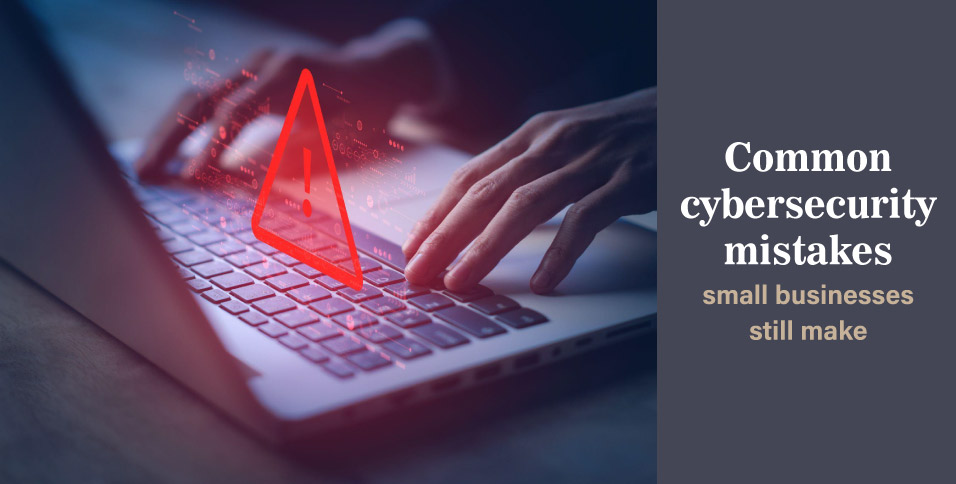Security breaches can cause online downtime that threaten your business. Cyberattacks have become more sophisticated in recent years, and can now cause greater damage in a digital world that is becoming increasingly complex.
More than half of all cybersecurity breaches that put businesses in danger are caused by human error. People are often either unaware of threats or careless with preventing them.
Here are some common cybersecurity mistakes, and how to avoid them. Taking the right steps to implement a security awareness plan and being aware of these mistakes will empower your employees to change their behaviour and protect your organisation from risk.
Employees having not enough cybersecurity awareness
Human error is a major cause of cyber attacks in business. People can make mistakes when they are tired, distracted, or not paying attention. Most of the time employees make bad decisions when they lack enough information to perform a task or action. Security breaches can occur for a variety of reasons, from downloading malware-infected files to not using a strong password. Train your staff so they are better informed on cybersecurity practices in your workplace.
Not monitoring your IoTs and endpoints
Many businesses today use mobile devices, laptops, desktops and other handheld electric products. This growing complexity of interrelated devices can make it difficult to identify real attacks, particularly sophisticated ones which can cause significant damage.Securing all these devices – collectively called endpoints – significantly improves the overall security of your enterprise’s IT network.
Failure to encrypt
Unprotected data can lead to fraud, identity theft and the theft of financial resources of employees and customers by hackers.
Both large and small companies, as well as public and private organisations, are affected by data breaches. Data is mobile, and is accessed, stored and transmitted in different ways. This means that new and more insidious threats are created every day. So encrypting your business and client data is the best way to protect it.
Not recognising spoofing techniques
A cyberattack called spoofing occurs when a scammer poses as a trustworthy source in order to access important data or information. Spoofing is possible through websites, email, phone calls and texts, as well as fake IP addresses, servers, and text messages. Malicious parties can carry out a variety of spoofing attempts. Email spoofing is one of the most common types of spoofing. Other forms include caller ID, GPS, text messages, website, and IP spoofing. You should not give out any data until you have confirmed the identity of who you’re speaking to.
Underestimating the threats
Hackers are using increasingly sophisticated tools as businesses become more dependent on the internet. Cybersecurity is more important than ever before – it protects us from hackers, cybercriminals and other fraud agents.
Security measures are less secure in smaller organisations. Hackers are searching for easy entry points into a network where they can wander around the digital network and find valuable information. You may think that your small business is not at risk, but in fact the opposite is true.
Not getting cyber security policy and insurance
It is important to raise security awareness in your workplace. A cybersecurity policy that is effective outlines the rules and responsibilities for protecting company data and IT systems. Cybersecurity procedures describe how employees, consultants and partners, as well as board members and other end users, can access online resources and applications, send data across networks and practise responsible security.
Another essential component to have in your cyber security plan is insurance. Cyber security coverage can protect against financial losses resulting from incidents and cyber-events. Cyber-risk insurance can also help with costs of remediation. This includes payment for investigators, crisis communicators, legal assistance and customer credit or refunds.
Unsecured password practices
It is difficult to remember complex passwords. Still, many users use easy-to-guess passwords like “Password123”, for all of their accounts. Using the same password can increase the risk of being hacked into multiple accounts. Worse, it may result in loss of sensitive and financial data. Over 81% of data breaches were caused by default, stolen or weak passwords. This is a clear indication of the havoc that a poor or reused password can cause.
Failing to update with time
Updates may seem annoying, but they are essential for keeping your devices and software secure. Updates to software can do many different things. Software updates can fix holes or security threats, improve the way software runs, remove bugs or add new features to replace outdated technology. Cybercriminals who use software vulnerabilities to compromise your device will also find it harder to steal your valuable data with regular updates.
Unfortunately, only 38% of small businesses upgrade their software regularly.
Not setting up multi-factor authentication
Multi-factor authentication is the most effective way to protect an organisation from remote attacks. When implemented correctly, it can stop most attackers from gaining a foothold in your organisation even if credentials are compromised.
Microsoft claims that multi-factor authentication can prevent 99.9% of automated malware attacks against Windows systems.
Not backing up consistently
Over half of businesses who are the victims of cyber-attacks or data breaches are then subjected to public scrutiny, which can lead to a loss of brand reputation, loyalty and trust from customers. Nearly a quarter (25%) of companies who suffer cyber-attacks or data breaches lose business opportunities as a result.
Regular data backups bring peace of mind. If a disaster or cybercrime occurs, the backup is ready to be used to restore a company’s archives. A data backup is essential to prevent the company from losing customers, investors and shutting down.
Keep your business thriving
Hopefully these valuable insights into the potential consequences of neglecting your online security can help you prevent the potential risks to your business, from educating employees to getting secure cyber coverage.
Organisations can no longer ignore the importance of cyber security. Correcting mistakes that you might make can help you prevent security breaches in your business. Don’t wait until it happens before making the changes!















